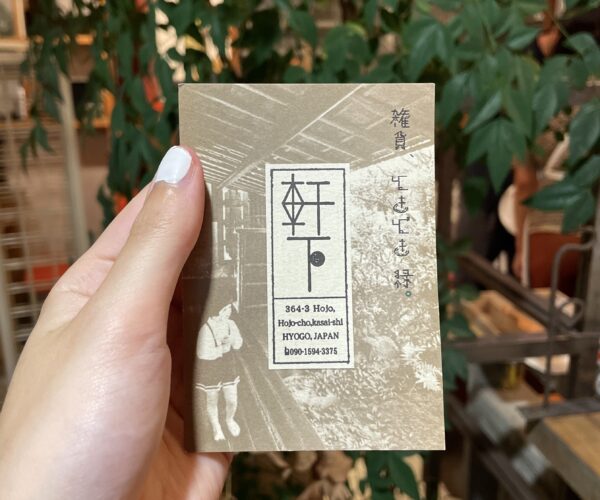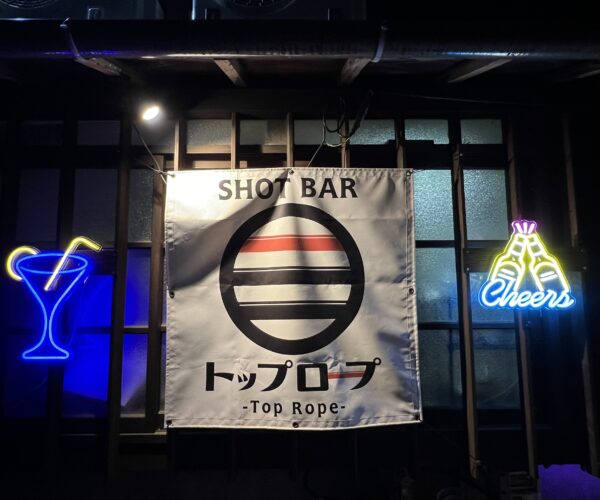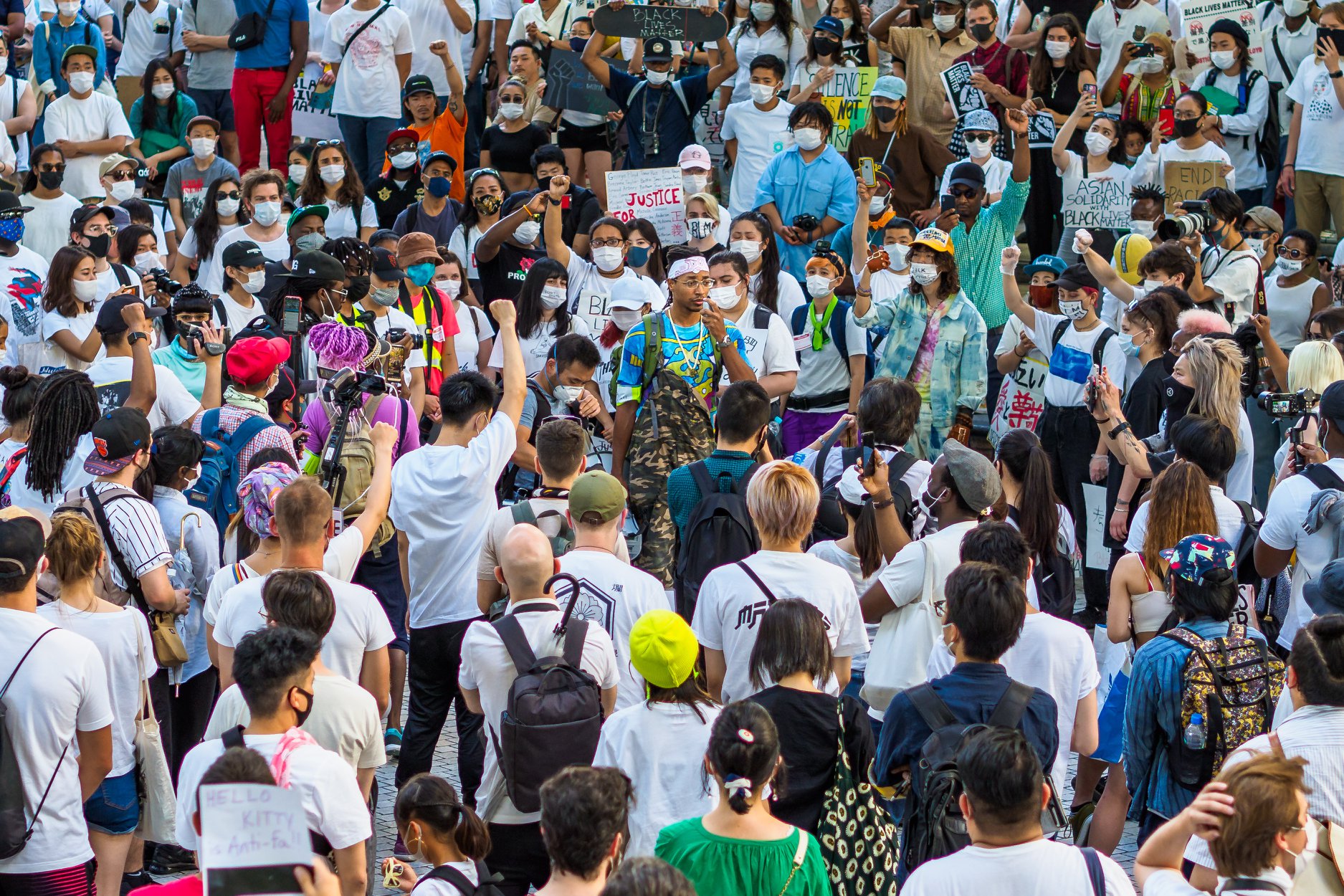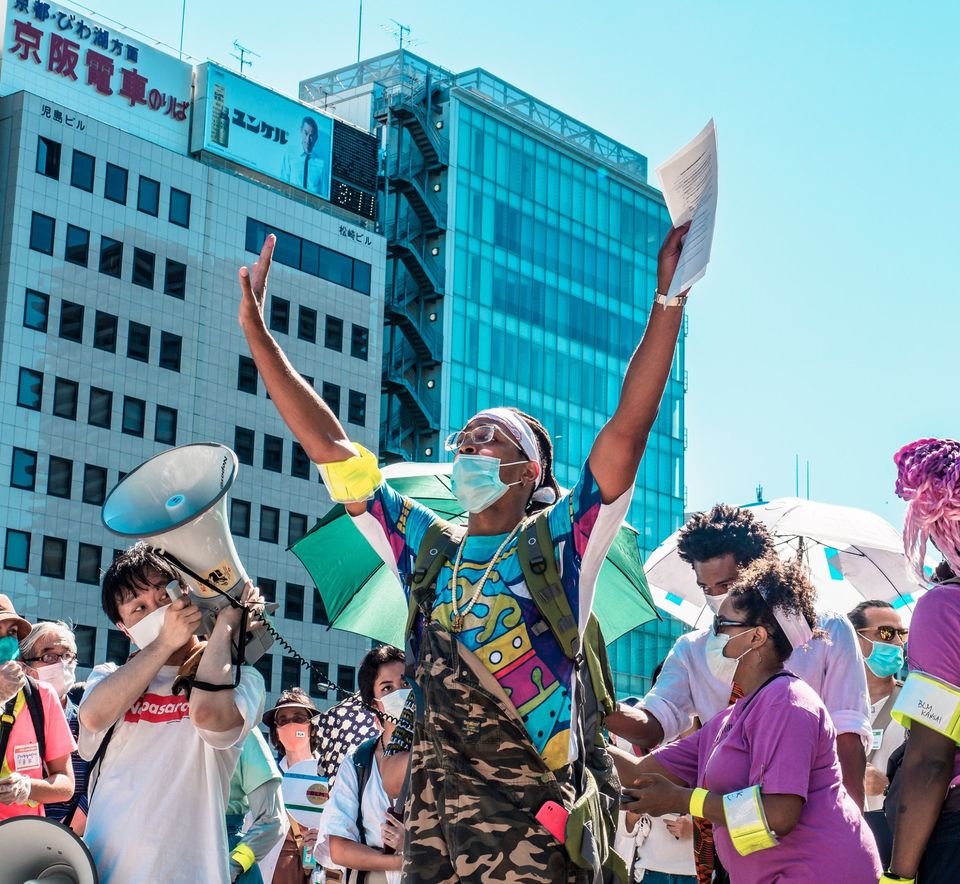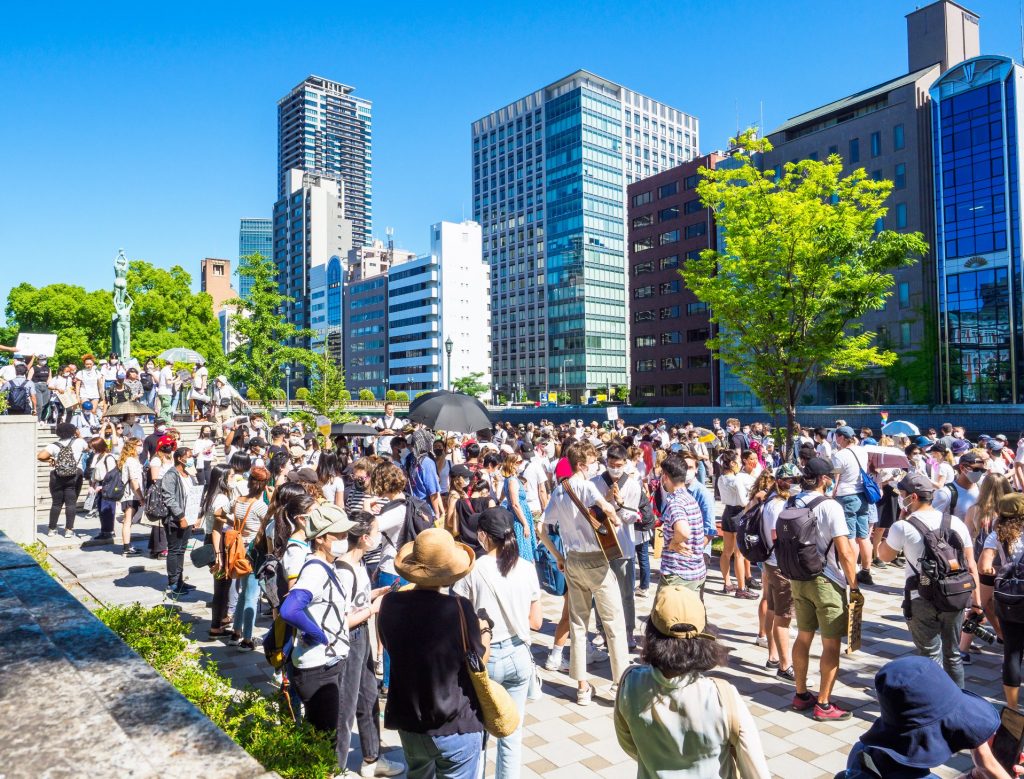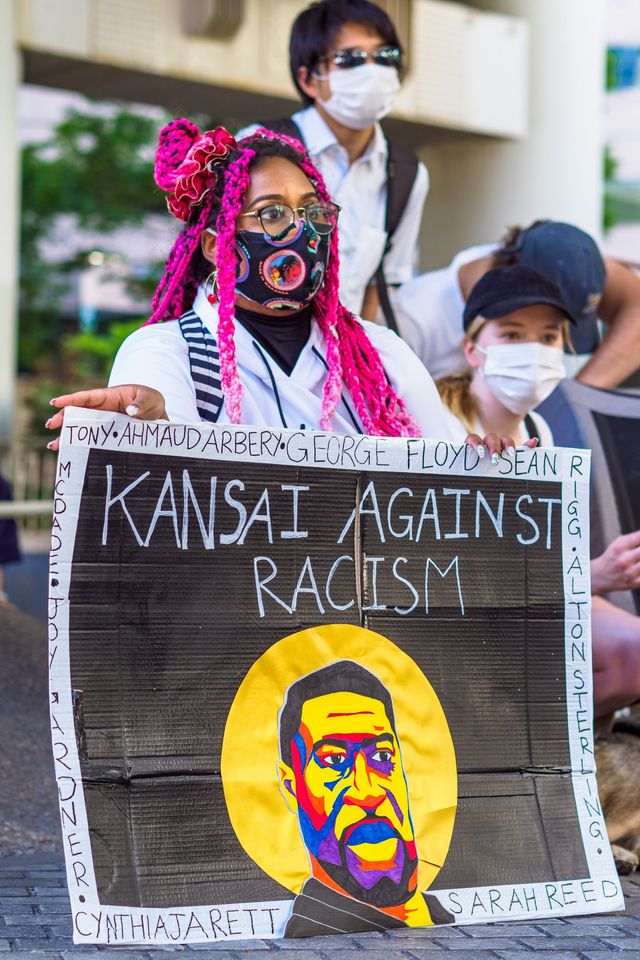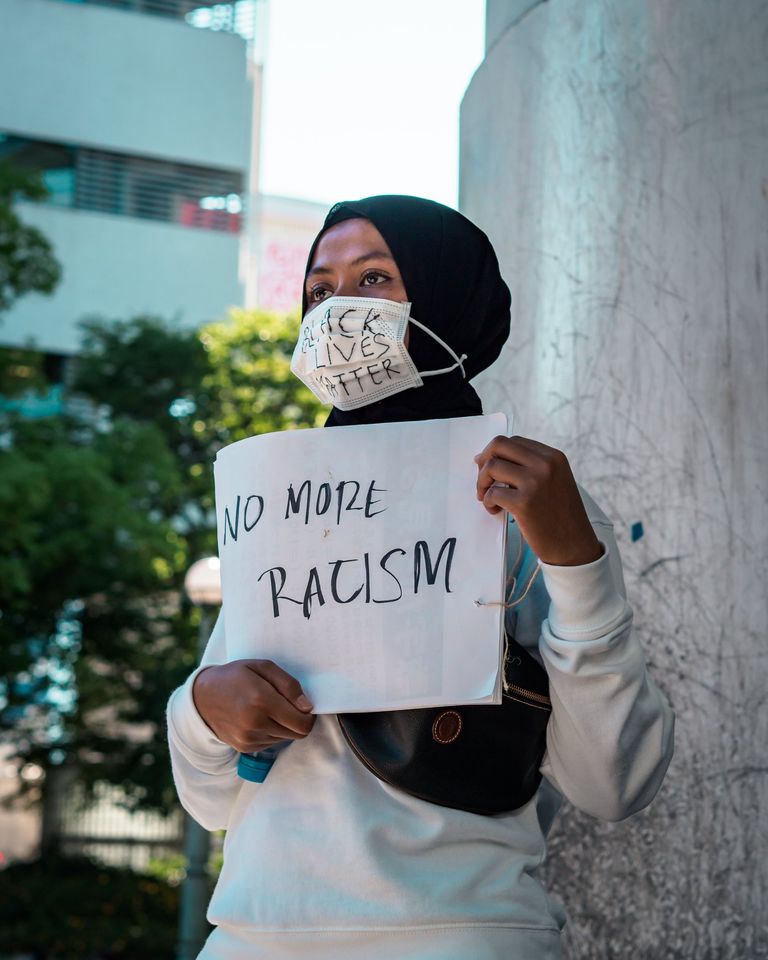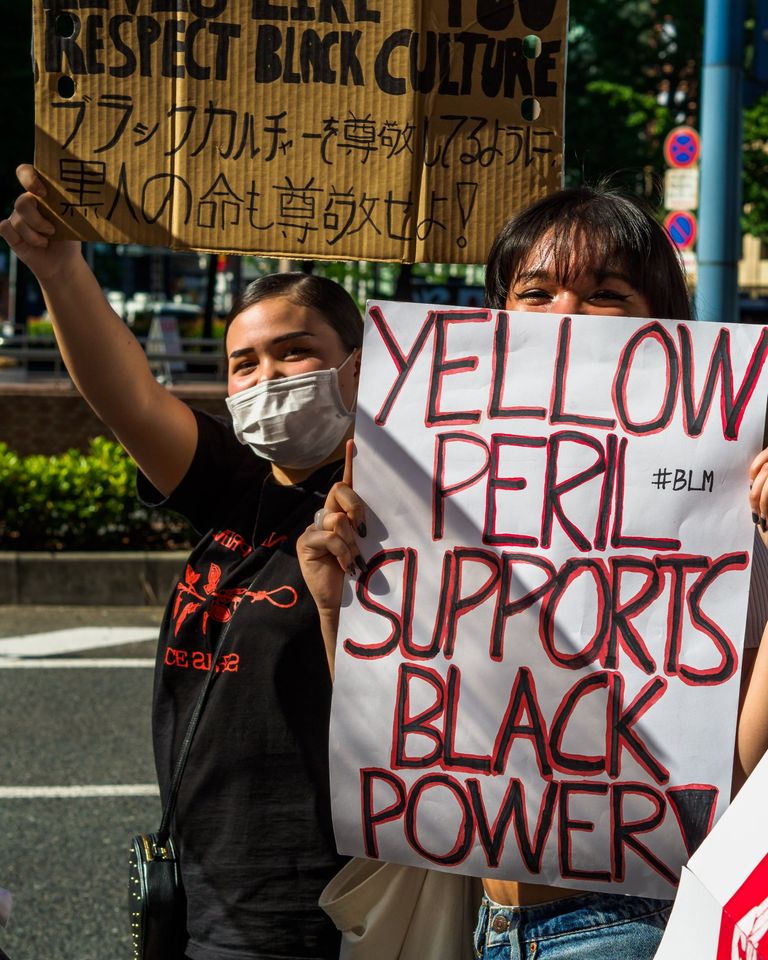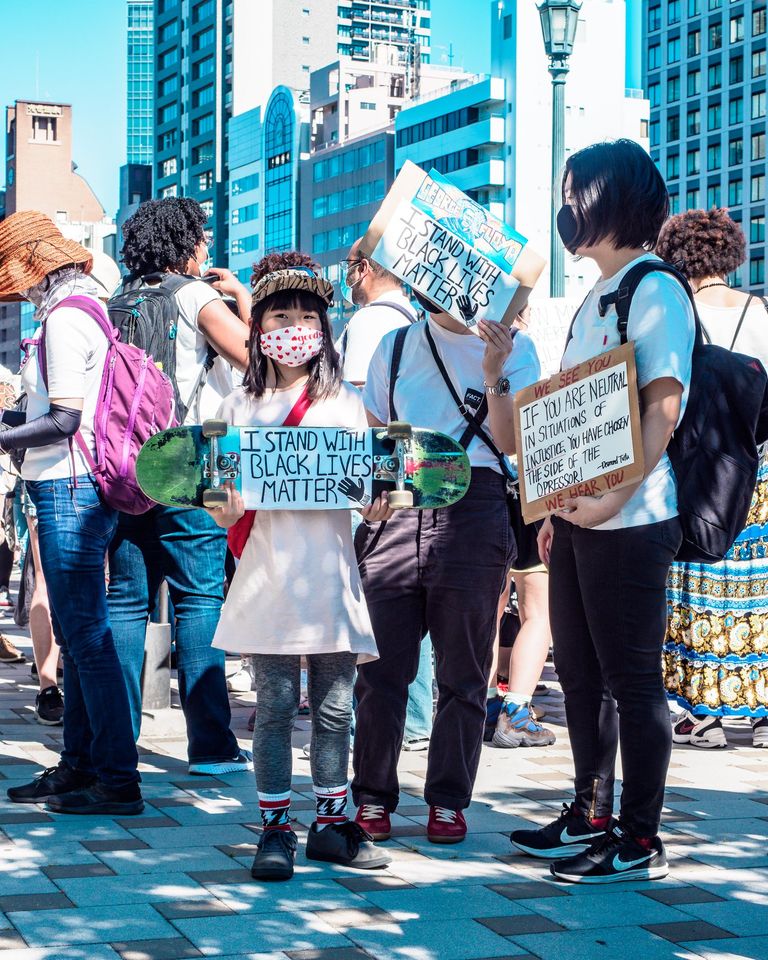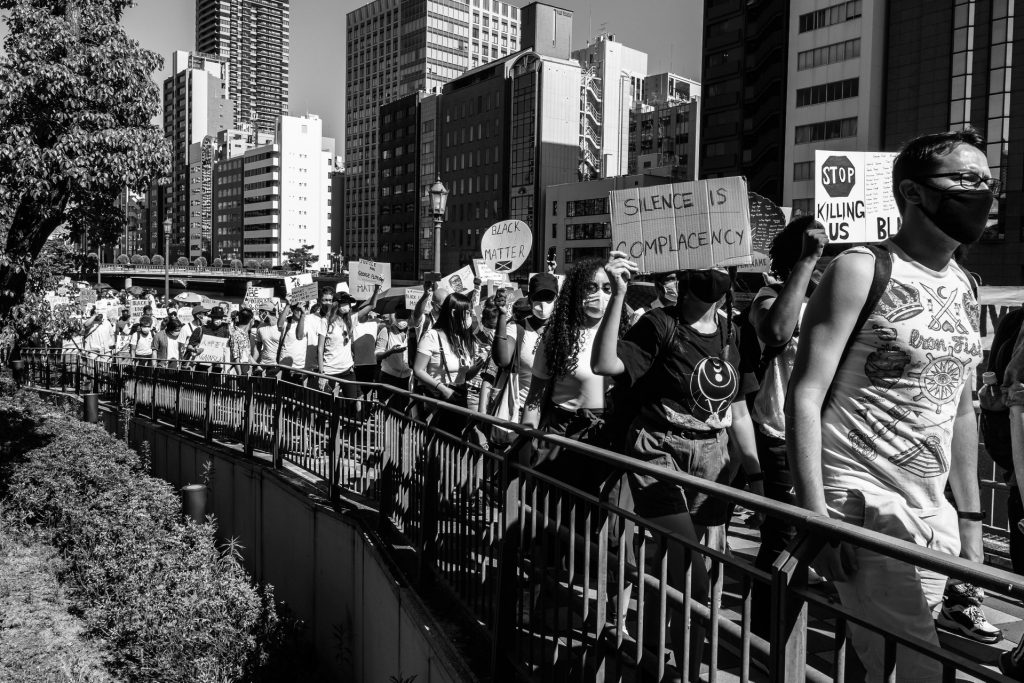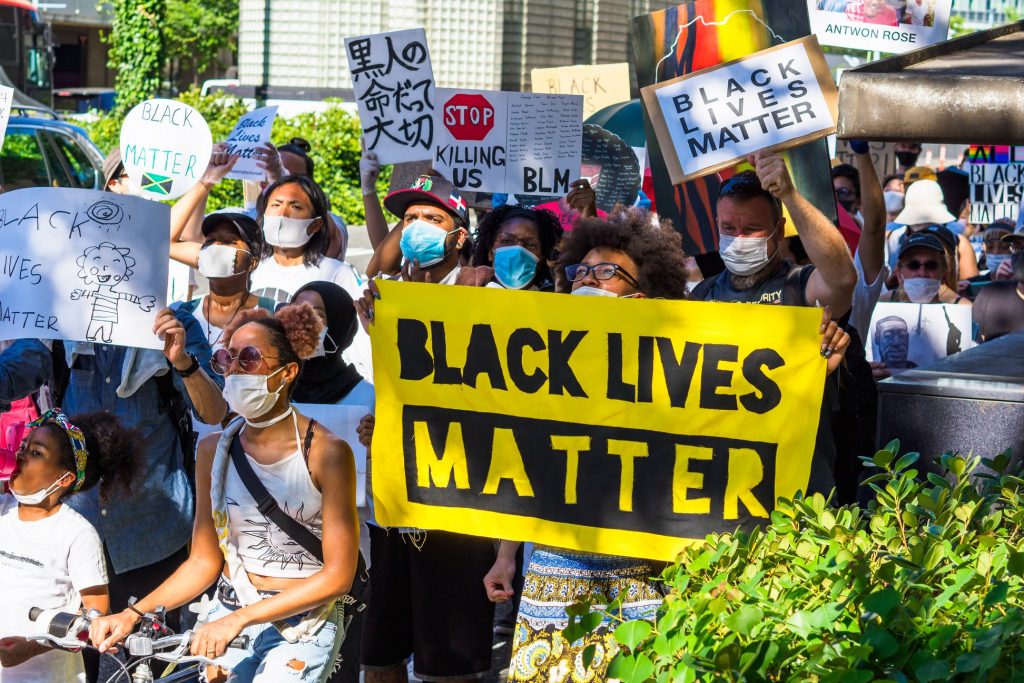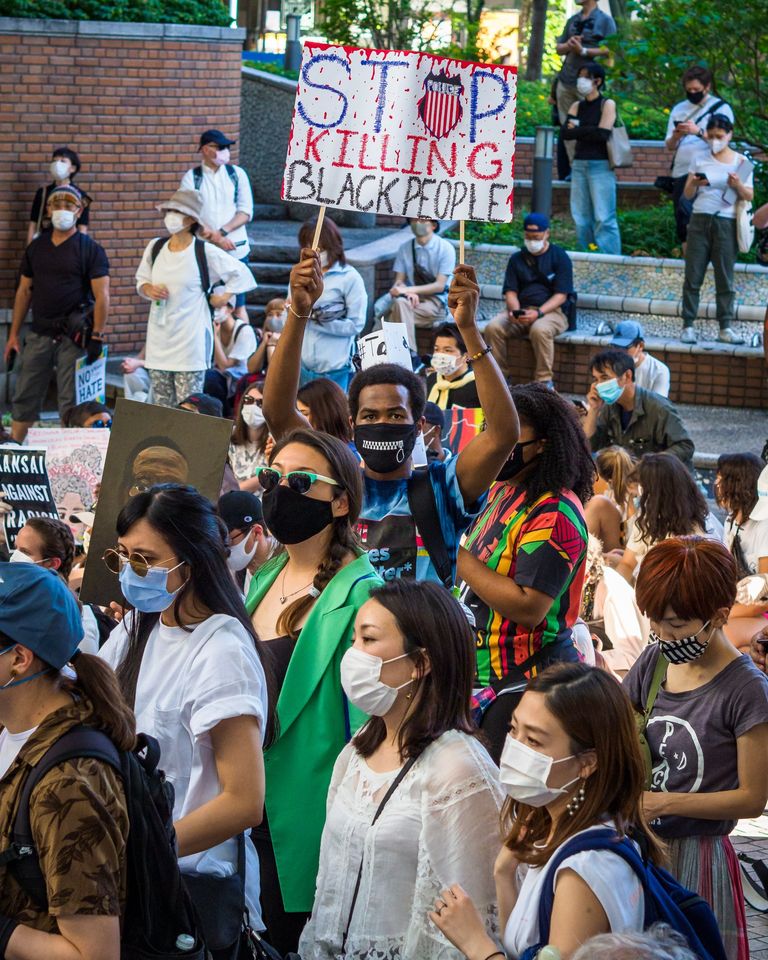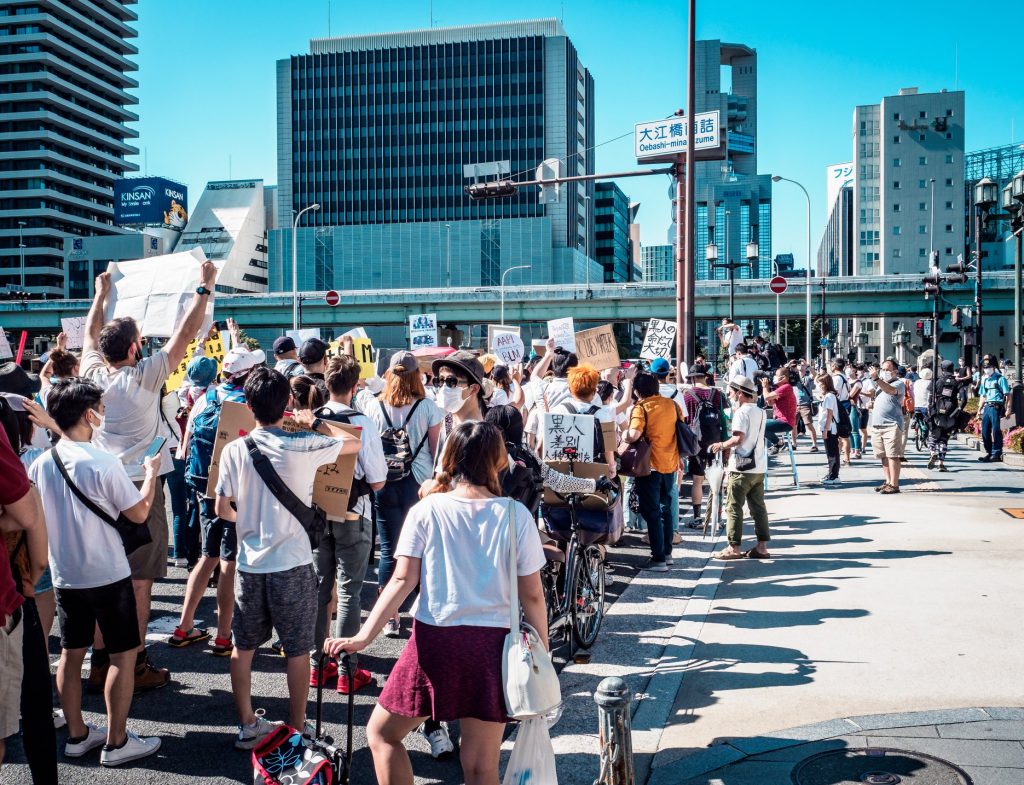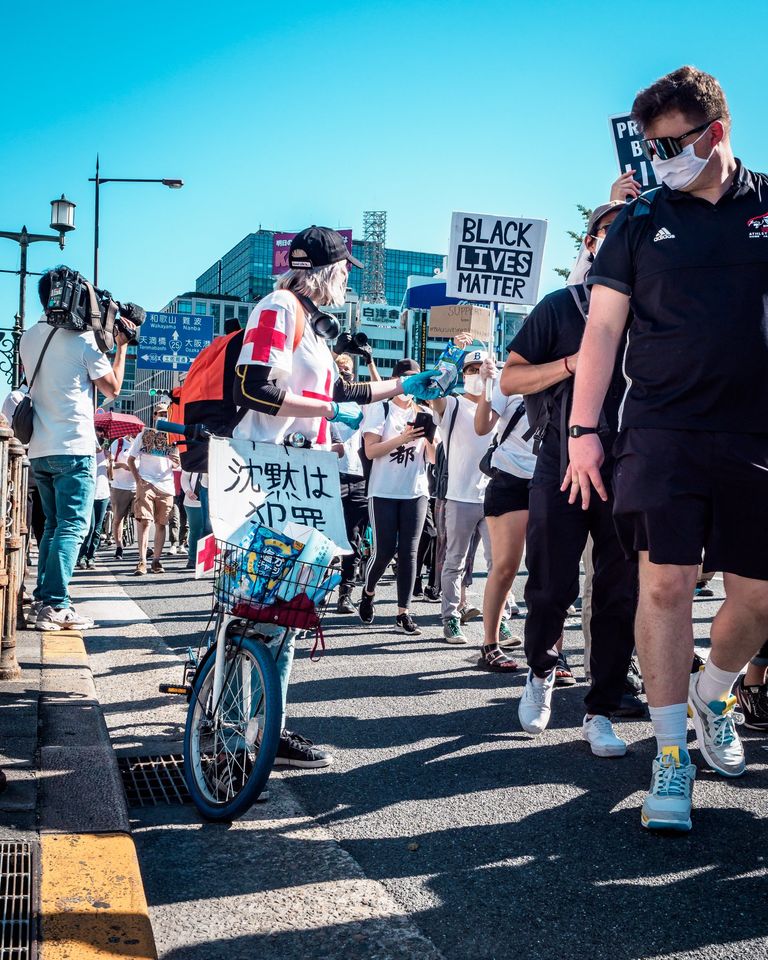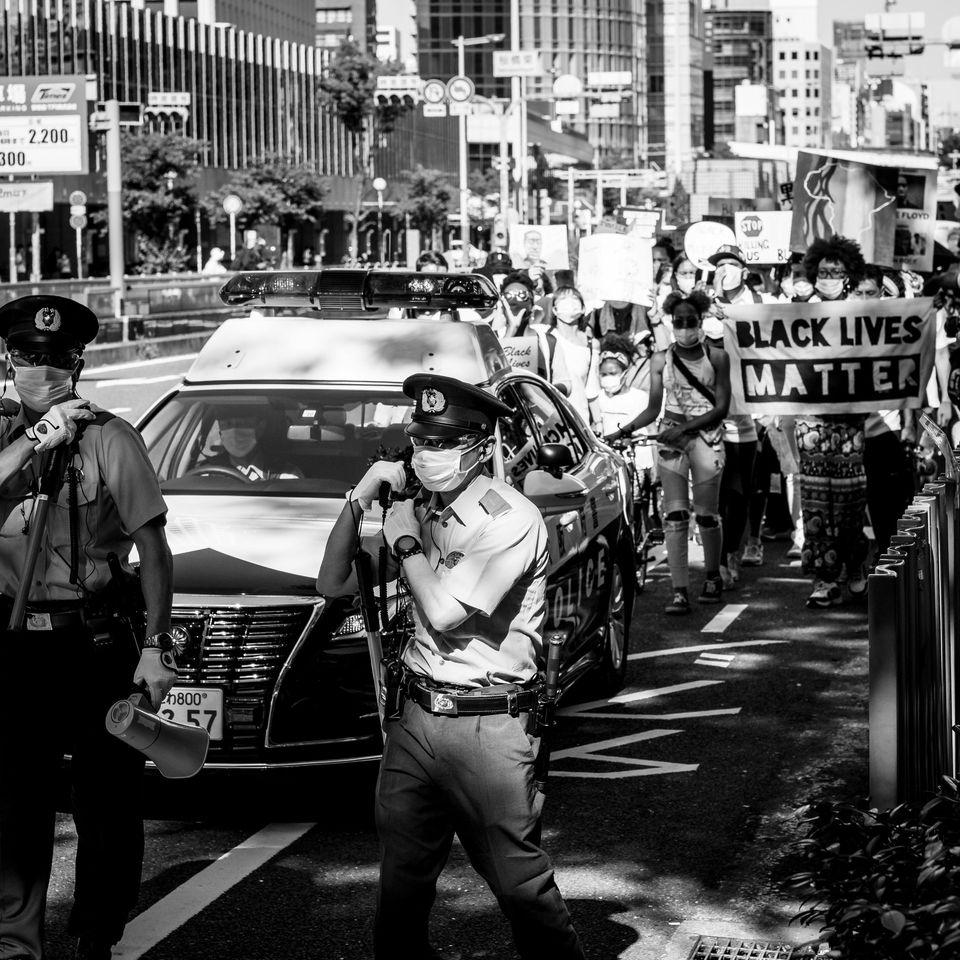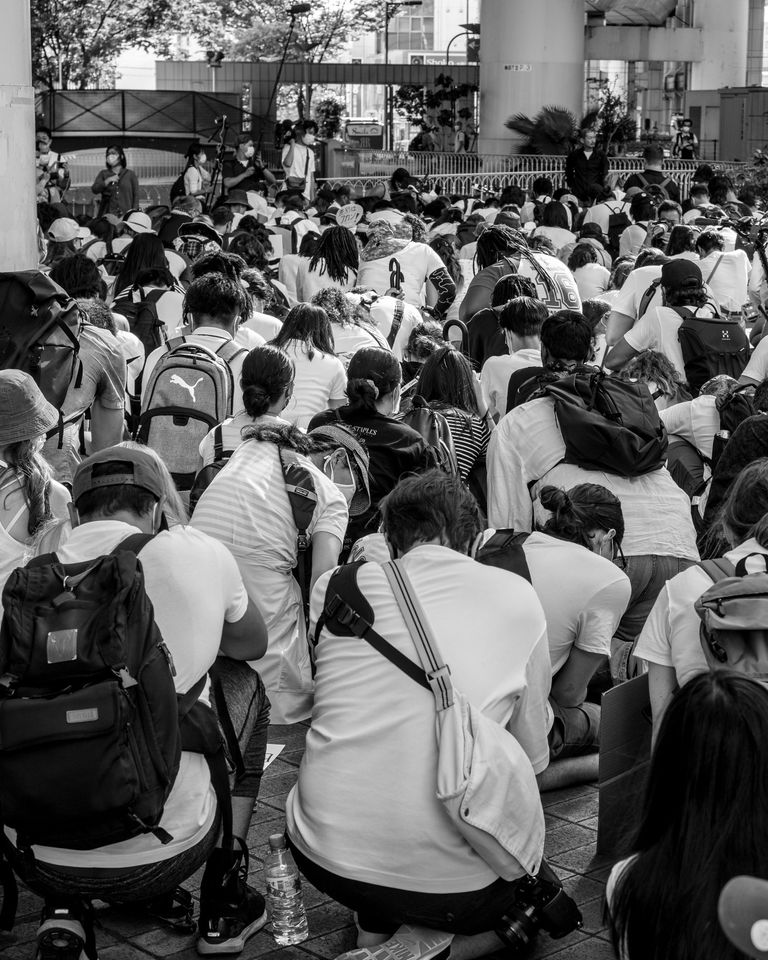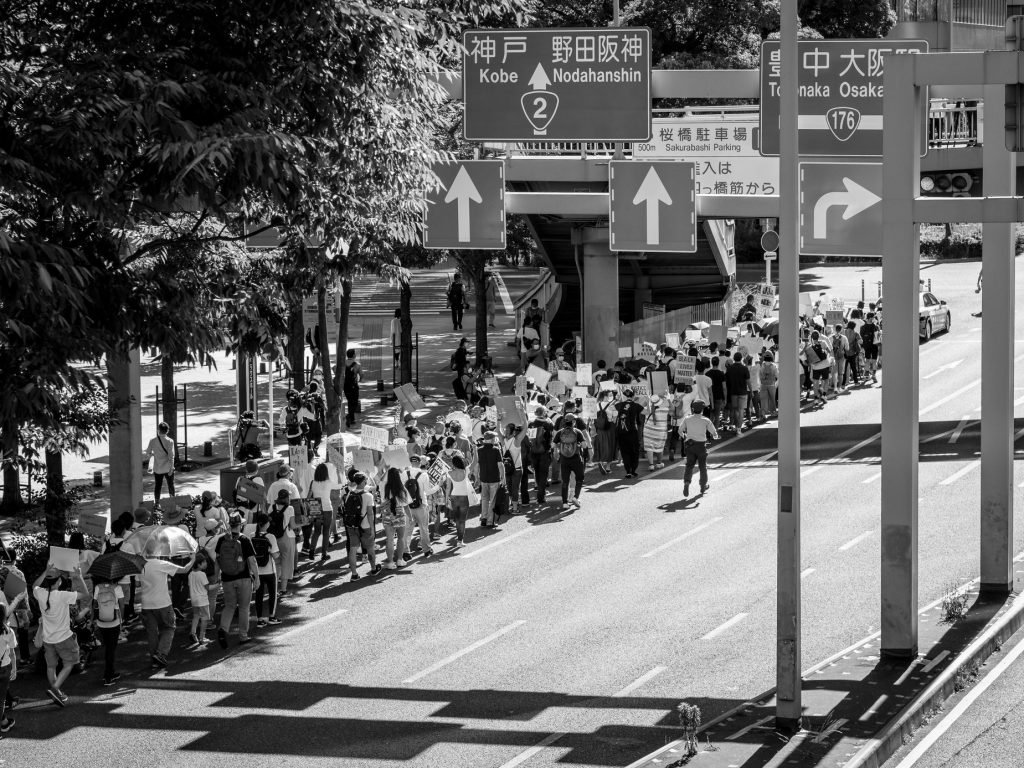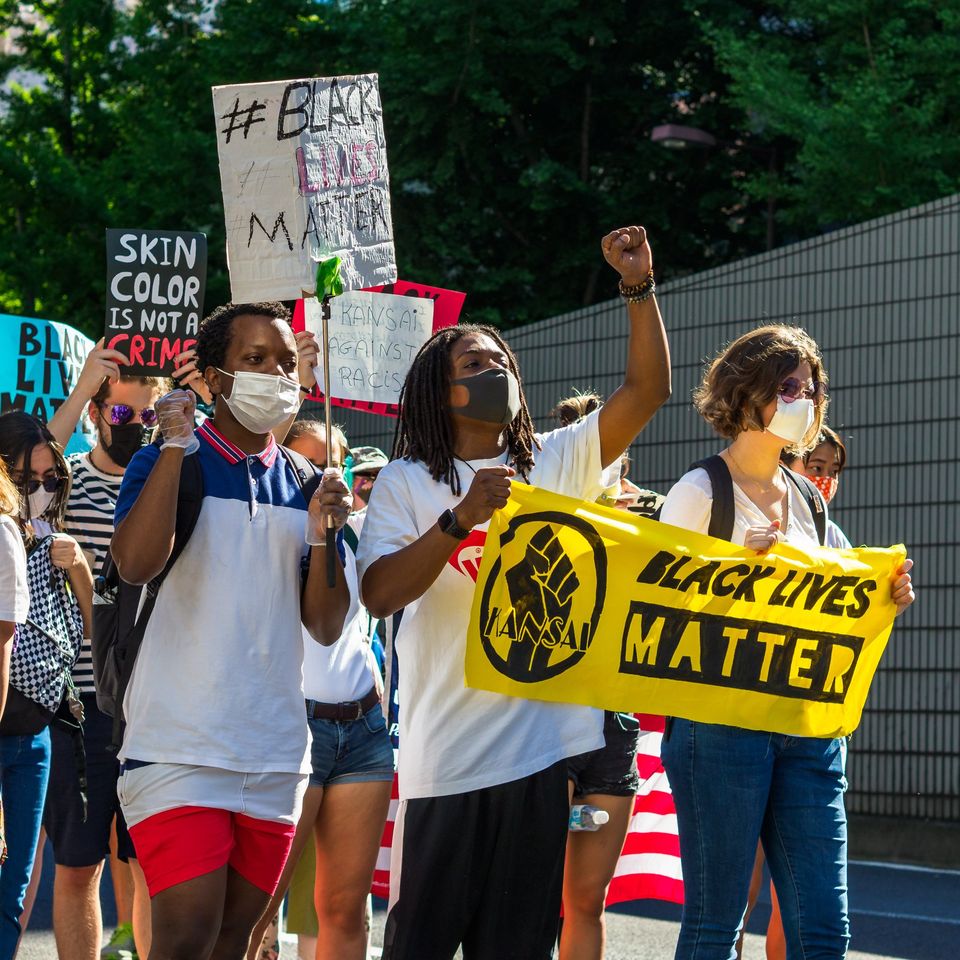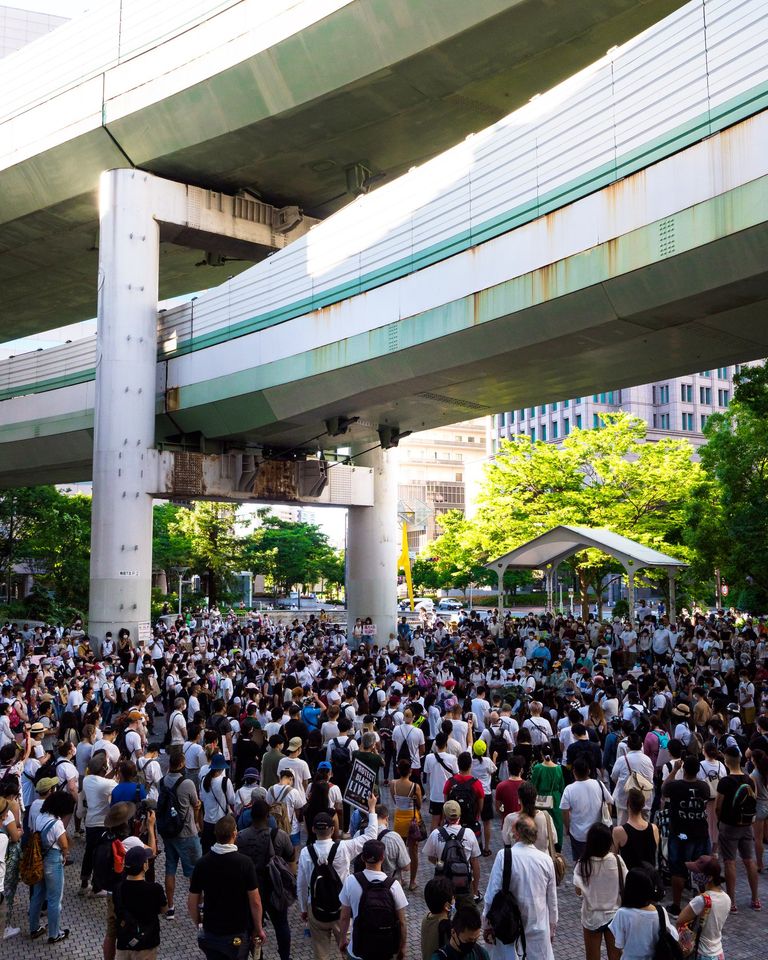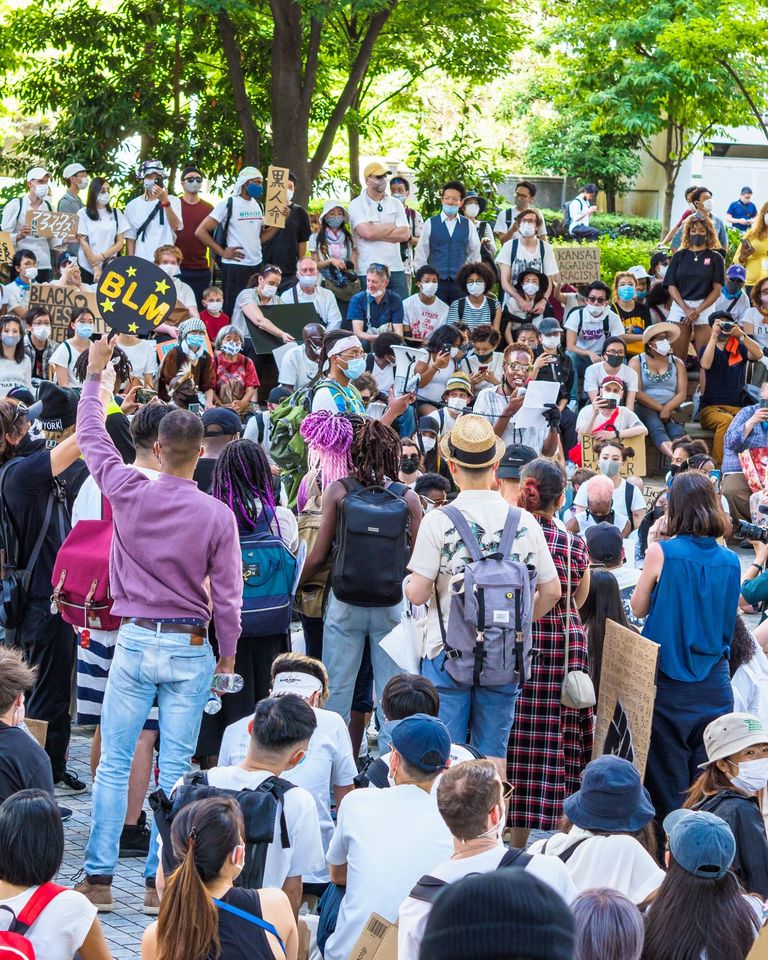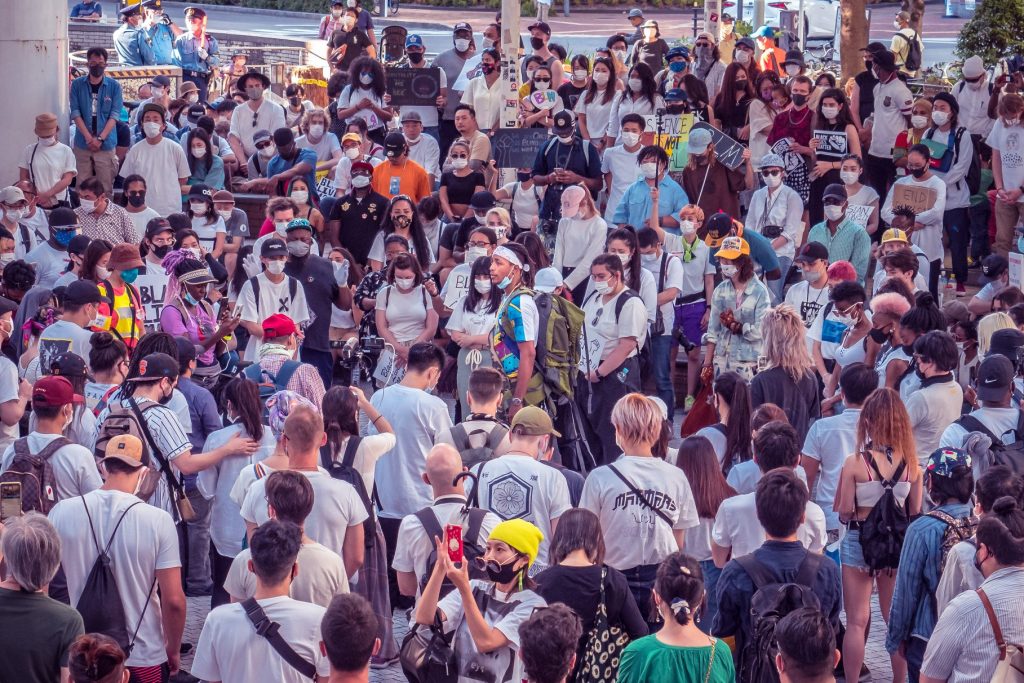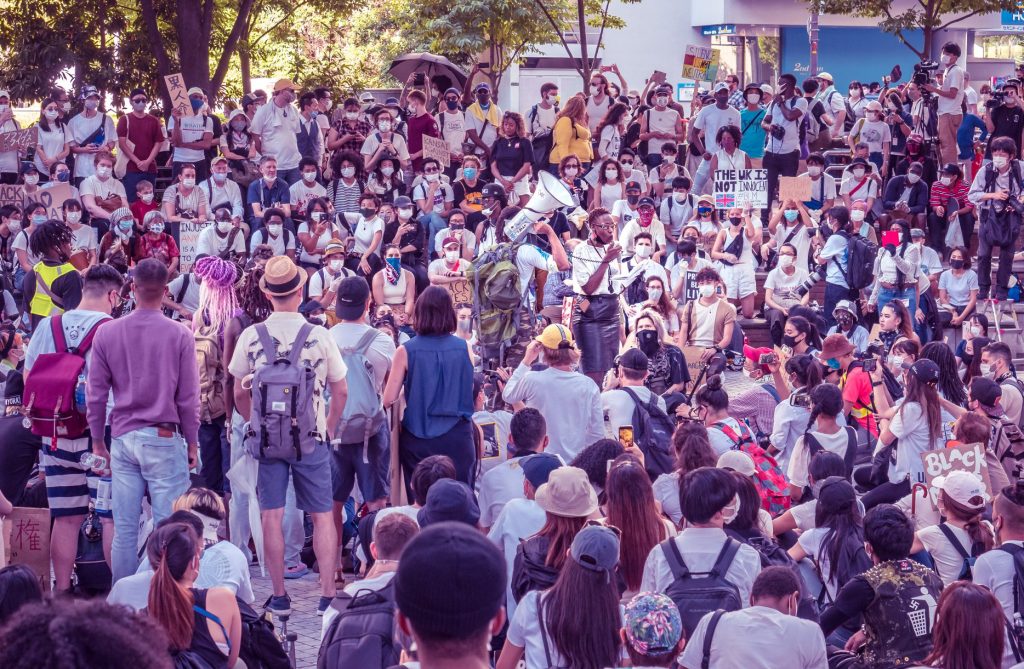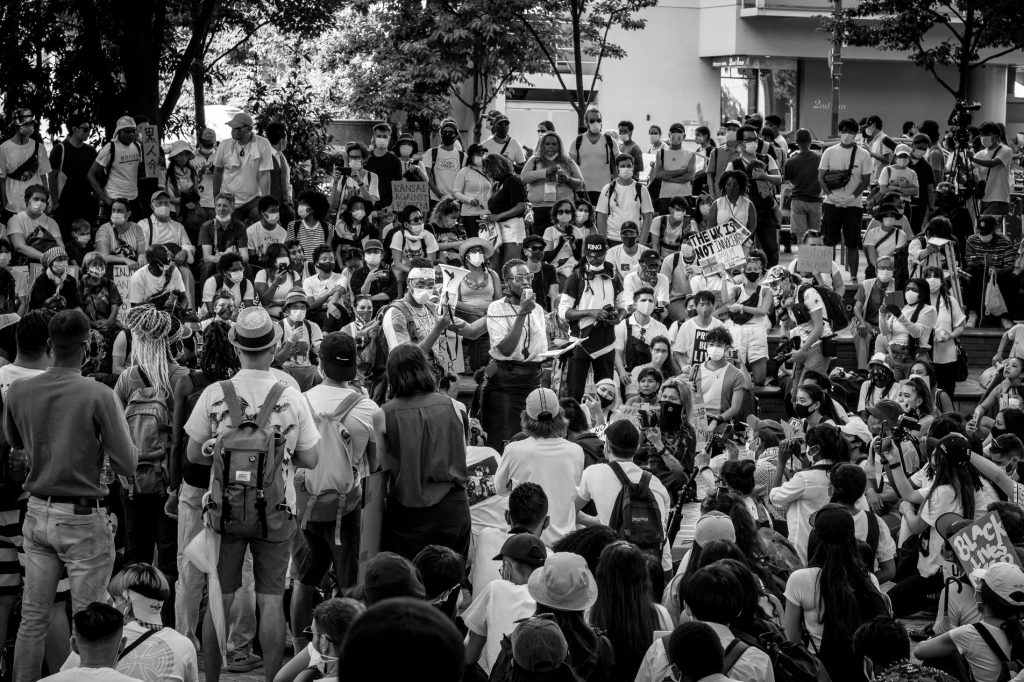An Interview with a Kansai March Organizer, Deuce Griggs
By Rhema Baquero (Kobe)
On a bright, sunny day in June, about 2000 people walked the streets of Osaka in a peaceful march against racism, around the world as well as in Japan. The marchers carried signs with messages of hope and enlightenment while they chanted cheers of justice for George Floyd, Breonna Taylor, and Ahmaud Arbery—Black Americans who were killed at the hands of the police and private citizens.
This event was the second like it this summer, after Tokyo, and was soon followed by marches in Kyoto, Nagoya, and Fukuoka. The Osaka march was organized by the Black Lives Matter Kansai group founders, including Deuce Griggs.
What was your role in planning the march and the BLM Kansai group?
My role was media relations. It kind of fits into my professional skill set because, when we were talking about roles and different obligations, everybody kind of did what they could because we only had initially about 10 organizers for a march like that. Nobody had experience in leading a march, so everybody was like, “Ok, what can I do?” and everybody pitched in where they could. And on the day of the event, I was very nervous. I was not supposed to speak or do anything because I was just talking to the media. We sent out a press release to a bunch of media outlets, but the person who was supposed to speak was a little nervous, so they ended up handing me the megaphone.
So, I acted as an MC for the entire event for the day. We had a couple of speeches, we led people through [the streets], we told them the rules they had to follow. And we had very moving and powerful speeches. And for me, I’m an African American male, and I truly embody what it means to be quote-unquote masculine, but that day, I cried in front of 2000 people because I was so moved by the amount of love and respect everyone had for each other. It was a very powerful thing.
I was going to ask you about the end of the event. It was time for everyone to clear out, but then the crowd started chanting “Black Lives Matter”.
Yeah, it was a very, very, very powerful moment. I don’t know who started it, but it was like the shot heard around the world for the American Revolution in my heart. But everybody just started marching, and then we had the whole moment of silence for George Floyd, and it really touched me that everybody was just following the rules. There were instigators in the crowd, but they were kind of pushed away from the amount of positivity we had in the area. So, for me just to see that and know that I am not alone, especially for being in quarantine for two months and not really interacting with other people, and then everybody coming together for this one moment to support the same cause, it really touched me.
I guess I was just kind of a little more vulnerable in that moment, but I’m glad that I had that cathartic moment where I could release and share with other individuals who had the same ideology as I had all in one moment. It was beautiful, it was powerful, it was more than words can actually describe for me: being in Chicago, living in Japan, having that moment, and being able to connect with people that really care about me and care about large issues as a whole.
You’ve had your own experiences with police brutality back home. What have been your experiences as a Black man in Japan?
To be a Black man here in Japan as opposed to America—I’ve been fortunate to have a platform. I’ve actually done TED Talks about my personal experience about moving through American society and having success that way. But here in Japan, I do not view the police force the same as I view the police force in America for the simple fact that, in America, I understand that the entire system itself is based in a racist, systemic, unjust system. The system in place in America is not built for African-Americans.
If you look at our history—even looking past the civil rights movement—at that point, everybody is supposed to be civil towards each other, and we are supposed to have the same rights. But there was an entire attack upon the African American community to break down families, to break down the image of what it means to be a Black man. What it means to basically be a human being. So, drugs were funneled into society in the 70s, and that really had an impact on the African American family.
From that point, there was a war on drugs in the early 90s, when I was born, so Clinton signed a bill to increase police presence, and it was mostly in African American societies. So, instead of giving individuals help, they would just throw them into prison. Look at the 13th Amendment: you’re basically a free person unless you have some sort of infraction towards the law, in which case you give up all freedoms. And prisons became big business — they had quotas that they had to fill, and prisoners were doing free labor for many corporations. And it was highly disproportionately targeted towards the African American community.
So, with me being African American and — even from the early age of 12 — being in my home, officers came to my house when I was there alone [and] knocked on my door because they thought I “fit the description.” Mind you, I was less than, like, 120 lbs, and they ripped me from my home. I was there alone, they threw me into a wall, they handcuffed me. And it really played on me heavily. It’s like, “Why would you do this to me?” They’re like, “Oh, you fit a description.” And from that point on, it was like, “Ok, I can’t really trust these individuals in uniform to protect my life.” And there were many, many other incidents after that point. I would be with my white friends, and they would ask me questions specifically, even though I was with an entire group. They would be like, “Hey, what are you doing here?” As opposed to asking us, “What are we doing here?” You know what I mean? So, it’s been a very difficult thing for Americans.
Coming into Japan, it was a little bit more refreshing. I never really had an incident with the cops where they’ve been physical with me. If I have trouble, I go and talk to them directly, and they offer me help. Myself personally, I’ve never been stopped. There are stories where people get stopped, and they’re asked for their foreign IDs or passports, but for my own personal narrative, that’s never happened to me. But I do acknowledge that that is something that happens here.
What would you like Japanese people to understand about the importance of holding a march here in Japan?
What I would say to Japanese people or anybody who would ask why we should have a march in Japan is that the amount of injustice with police brutality is happening in America, but it stands as a signal. As America being one of the world’s quote-unquote leaders, a hegemon, [it shows that] if it can happen in America, it can happen in your own home. So, it is time for us to stand in solidarity; especially, African Americans here in Japan who can’t actively be cathartic, or actively march, or actively do whatever in America.
We want to let our brothers and sisters back home know that they’re not alone. We want to walk and march with them in solidarity and show the rest of the world that, “Hey, even though this is an issue happening back in America, it could have very well been your best friend here in Japan. It could have been your best friend in Germany. It could have been your teacher in Israel. It could have been anywhere in the world.” And it is important to know that an injustice somewhere else in the world is not tolerated anywhere else in the world.
So, by having these marches internationally, we’re letting America and politicians and policymakers know that the rest of the world is watching, and we are not pleased. It’s also very cathartic for individuals living here in Japan to have that experience and have these conversations because it’s not just a Black issue. It’s not a White issue. It’s an issue that affects every individual. It’s a human rights violation, and it shouldn’t be stood for.
Volunteering seems to be in your background. How did that lead to you wanting to take a role in planning this Black Lives Matter march?
First and foremost, I’m a human being, and I connect to people very easily. I’m very empathetic. And myself being a Black man, and also being a victim of police brutality [and] injustice; in my own youth, even at age twelve, it’s something that resonated with me quite heavily. I’m also very active in the community here. I’m really good at networking, and people said they wanted to march. So, I was talking to another individual, and she is also heavily into the community as well. A couple of university students, actually, they started writing out the paperwork, but they wanted a little bit more help, and they also wanted a voice from the African-American community. So, my name was thrown into the ring, and naturally, I answered the call. And from that point, I’ve been going 110% into the Black Lives Matter movement here in Kansai as well as the rest of Japan.
So basically, it’s more a privilege for me than anything else to be able to help wherever I can and give my expertise and my voice. And since our march on June 7, we had over 2000 people actually come over to the Kansai march here in Osaka, and it’s been a platform for individuals who haven’t had a voice here in Japan to voice their concerns. And actually, before we even started marching, I was really afraid because I didn’t know if I would lose my job because there were a lot of rumors running around that foreigners can’t protest, which is actually false. We still have the same rights as Japanese nationals as long as we follow the rules, file paperwork, etc. We can participate in those things.
What were some of the concerns and difficulties of organizing it?
So, I stated before that nobody really had much experience organizing this sort of thing. So, we were pretty much on the clock 24 hours for five days, planning [and] talking about risk management, volunteers, first aid, legal [matters]… and really just trying to figure out everything that could possibly go wrong. Black people are not a monolith in the sense that everybody has different opinions. Even though we stand for a common thing, everybody wants to approach it in a different way.
So, we internally still had to figure out how we wanted to do everything that we were going to do. Just assigning roles, that was one of the most difficult things. We wanted to make sure that the movement wasn’t just one person; it was a group of individuals working for everybody else. So, even though we were the organizers, we wanted to make sure it was the people’s movement.
It was also kind of difficult from my perspective, trying to figure out the narrative we wanted to share [and] making sure that we have proper representation in the media. And I think we did a pretty good job of it. There were a couple of misprints as far as the number of people that went. But overall, it was really well received.
What was it like working with the police to serve as a guide and escort for the route?
The police were extremely helpful. They gave us all of the rules that we needed to follow beforehand. We would check in with them daily just to make sure we were doing everything the right way, legally. And then, the day of, the organizers were kind everywhere because there were 10 of us and 2000 of everyone else. I was actually talking to the cops because I speak both English and Japanese, and they were telling us, “Cool, we want everybody in groups of 200. We want to just move everybody.” But when they saw everybody, they were like, “Ok, let’s call out the rest of the police force to make sure nobody else really messes with these guys.” They gave us a lot of information, and I appreciate the fact that everything was peaceful and everybody respected each other mutually.
What was going through your mind during the march?
I was running around like a chicken with its head cut off, actually. We were just trying to make sure the rules were staying in place. We had a couple of the organizers go in the first group. I stayed all the way until the end, until everybody left the area, because there was an instigator there. I wanted to make sure he wasn’t going to do anything to anybody; even though we had the police force there, I just wanted to make sure for my own sake. Once everyone left the initial meeting place, me and other organizers basically ran all the way to the front so that we could be there to give speeches and make sure everybody was in a safe place, and just be there for the most part.
Overall, I feel we had a pretty successful march. It was stressful planning — it was stressful during and even a little bit afterwards — but to see the impact that it had on society here in Japan, where you have Naomi Osaka speaking out [and now] there is a baseball player here who is also half—he is starting to speak out now. To give hafus [Japanese with mixed ethnic backgrounds] in Japan a platform to speak on, it’s really awe inspiring for me.
People probably don’t think [our march] had a huge impact, but it definitely gave us a voice, and it gave us a platform, and it allowed us to call out different injustices that we see. And it sparked something else in the rest of Japan. It’s countrywide right now where everyone wants to show support and solidarity. And it’s crazy—we didn’t really imagine it growing that way. But it has evolved into its own thing in Japan. I honestly couldn’t be happier.
We know this is not the first instance of police brutality in America. But what do you think is different this time to ignite such a fire around the world?
It’s probably a multitude of things. For the last 400 years there’s been police brutality going on. In recent years, we’ve had smartphones where people can take videos and actually see it. And when you see something like that, it’s visceral. When you see somebody get murdered, and they look like you, and you keep seeing it over and over and over. The Black Lives Matter movement started when Trayvon Martin was shot by George Zimmerman, and there was no real justice for that. Zimmerman to this day is still a free man; he’s signing Skittles bags. And that really touches you in a different way when you continuously see it happen to your people, when they look like you. I’m a strong advocate, and I strongly believe that representation matters, so when you keep seeing people like you, murdered continuously, over and over and over and there is no justice, there is an internal rage. That’s the first point.
The second point is with COVID-19, as a global community, we’ve been in isolation for months. To sit at home and just see these things happen over and over and over. When you saw it happen to Breonna Taylor, when you saw it happen to George Floyd, when you saw what happened to Tamir Rice . . . when you see it happen over and over and you’re in isolation, what does that do to your mental health? It’s so many things that will just build up in you and you have to cathart [sic] at some point. You have to let it out.
So I know COVID-19 was a horrible, horrible thing as far as affecting millions of lives and changing what is normal, but I believe that that’s probably one of the biggest contributing factors why individuals were willing to get up and say something and do something because they were tired and they were in isolation, and they were like, “This can happen anywhere.” And to see this dude on the ground for 8 minutes and 46 seconds, it touches you in some way. And I feel like people were just fed up. That was the last straw. And it was just happening, boom, boom, boom, boom, boom. And that just happened to be the spark that set the whole thing ablaze.
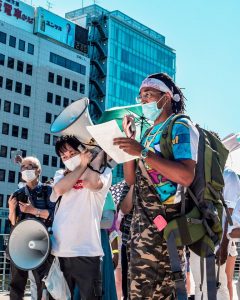
What do you think is really going to bring about the change in America?
This answer is completely separate from our Black Lives Matter Kansai. This is my own personal opinion.
In the history of everything that I’ve ever studied, true change only comes through revolution. Revolution in the sense of action being taken where something is broken down. America got its independence by having an entire war. The Civil Rights Movement did not happen until different people of the same background with different ideologies all got together and started marching, riotiong, protesting. When the Black Panthers started doing their activities, when they stood with assault rifles on Capitol Hill, then [people] started thinking, “Oh . . . oh . . . we should probably do something about this.”
So at this point in time in history, in 2020, we’ve made massive moves as a society as far as recognizing LGBT rights, as far as recognizing America was wrong for Japanese internment. [We’re] apologizing for our deeds in the past. But African Americans have constantly been looked over in that sense. There’s been no reparations, there’s been no formal apology for slavery. It’s like, “Ok, now pull yourself up by your bootstraps.” And now that we are taking action and moving again because there is still something wrong with the system, and [our movement is] threatening to the system, they have to answer that call.
When it comes to everything that has happened in America with the marches, with the protest, with the looting, it’s getting the attention to make people think and to start having these conversations because if this stuff did not happen, these conversations with universities and police forces would not even happen, because everybody would be OK with the status quo. So the only thing I believe is going to bring about real change is the things that are happening right now.
What is next for the BLM Kansai group?
There’s a lot. So right now we are doing a lot of consultation with other cities. One of the main things that we really want to focus on is education. We’re in talks with different universities to speak on Black Lives Matter as well as Black history, and how people can be better allies. [We’re] helping out other cities and other chapters who want to do the same types of things that we’re doing now and just educating the masses about why Black lives matter. That’s a ridiculous sentence for me to even say, honestly. But it’s to let people know, “Hey, this is why we are saying this. This is what’s going on and this is what you can do to help.”
How can people help progress this movement?
There are a multitude of things you can do. The easiest thing you can do is educate yourself. I would like to say: “each one, teach one.” If you know something about what’s going on, teach somebody or be willing to have an uncomfortable conversation with individuals because everybody obviously doesn’t have the same knowledge background, and the narrative of African Americans has been grotesque, for the lack of a better term. There was a video on NHK. They’ve since apologized for it and they said they are going to start taking actions to do better in the future. But there is this narrative that African Americans are big scary people and they’re just angry, you know, “We want money and a whole bunch of other things.” And there’s some truth to that, but it is grossly simplified and the nuances are not really touched upon.
So, I really want individuals to go out and learn. Listen. I know they are hearing things, but I really want them to listen and take it in and see what they can do to be better allies. So to simplify that whole answer, “each one, teach one,” that’s the easiest thing you can do.
If you want more information about that, Black Lives Matter Kansai is offering information on social media. You can also look at different documentaries. Probably one of the easiest ways for people in Japan [to help], especially Japanese people, is to follow Black Lives Matter Kansai or BLM Kansai on Instagram, Facebook, and Twitter, because we have an entire team of volunteers who are willing to give you that information and change the narrative of what is actually going on and how people view African Americans.
Anything else you would like to add?
Even if you are on JET, there’s always something that you can do — never feel helpless. You can reach out to us if this is something you feel really passionate about. And you know, just be a decent human being.
All photos by @infernalbbq, www.picsmithmedia.com
Check out the video coverage by Sam Marange.
Chicago-born, Osaka-based Deuce Griggs helped to organize the Kansai Black Lives Matter peaceful march that took place on June 7, 2020. He first came to Japan in 2011 after the Tōhoku incident and Fukushima meltdown to teach English and to help individuals who were affected by the Tohuku disaster. He returned for a three year stint on the JET Program in 2014 and now works as a social media manager for the Kansai Tourism Bureau.
Rhema Baquero is a third-year ALT from America, placed in the great port city of Kobe. She can often be found in a coffee shop either reading, writing, drawing, or studying Japanese. After playing rugby at university and graduate school, she was excited to finally attend the Rugby World Cup in 2019.

